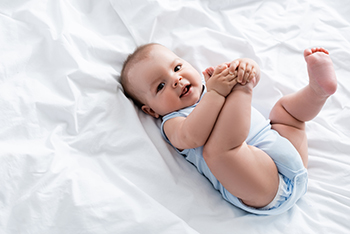NJ (908) 688-5577
NY (212) 737-2528

Congenital foot conditions often have unique signs, aiding in the diagnosis of underlying systemic issues. Conditions such as Ellis–van Creveld syndrome, fibrodysplasia ossificans progressiva, and Marfan syndrome show distinct foot abnormalities. For example, Ellis–van Creveld syndrome may feature extra toes, while fibrodysplasia ossificans progressiva can cause deformities in the big toe. Similarly, conditions such as Kniest dysplasia may lead to short and deformed toes, and pseudo- and pseudo-pseudohypoparathyroidism can result in shortened metatarsal bones. Additionally, acromegaly can cause swelling and softness in the feet, while nail-patella syndrome may affect the toenails. Mucopolysaccharidoses often result in widened toe bones and thickened skin on the feet. If your child was born with a foot abnormality, it is strongly suggested that you schedule an appointment with a podiatrist as early as possible.
Congenital foot problems require immediate attention to avoid future complications. If you have any concerns, contact Glenn Davison, DPM of Advanced Podiatry. Our doctor can provide the care you need to keep you pain-free and on your feet.
Congenital foot problems are deformities affecting the feet, toes, and/or ankles that children are born with. Some of these conditions have a genetic cause while others just happen. Some specific foot ailments that children may be born with include clubfeet, polydactyly/macrodactyly, and cleft foot. There are several other foot anomalies that can occur congenitally. What all of these conditions have in common is that a child may experience difficulty walking or performing everyday activities, as well as trouble finding footwear that fits their foot deformity. Some of these conditions are more serious than others. Consulting with a podiatrist as early as possible will help in properly diagnosing a child’s foot condition while getting the necessary treatment underway.
What are Causes of Congenital Foot Problem?
A congenital foot problem is one that happens to a child at birth. These conditions can be caused by a genetic predisposition, developmental or positional abnormalities during gestation, or with no known cause.
What are Symptoms of Congenital Foot Problems?
Symptoms vary by the congenital condition. Symptoms may consist of the following:
Treatment and Prevention
While there is nothing one can do to prevent congenital foot problems, raising awareness and receiving neonatal screenings are important. Early detection by taking your child to a podiatrist leads to the best outcome possible.
If you have any questions please feel free to contact our offices located in Union, NJ and New York . We offer the newest diagnostic tools and technology to treat your foot and ankle needs.